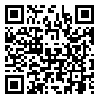Volume 17, Issue 2 (Vol 17,No.2, Summer 2021 2021)
irje 2021, 17(2): 174-183 |
Back to browse issues page
Download citation:
BibTeX | RIS | EndNote | Medlars | ProCite | Reference Manager | RefWorks
Send citation to:



BibTeX | RIS | EndNote | Medlars | ProCite | Reference Manager | RefWorks
Send citation to:
Jalali-Farahani S, Amiri P, Shayeghian Z, Parvin P, Cheraghi L, Azizi F. Comparison of Self-Care Behaviors in Patients with Type 2 Diabetes before and after the Covid-19 Pandemic: Tehran Lipid and Glucose Study. irje 2021; 17 (2) :174-183
URL: http://irje.tums.ac.ir/article-1-6995-en.html
URL: http://irje.tums.ac.ir/article-1-6995-en.html
Sara Jalali-Farahani1 
 , Parisa Amiri *
, Parisa Amiri * 
 2, Zeinab Shayeghian3
2, Zeinab Shayeghian3 
 , Parnian Parvin4
, Parnian Parvin4 
 , Leila Cheraghi5
, Leila Cheraghi5 
 , Fereidoun Azizi6
, Fereidoun Azizi6 


 , Parisa Amiri *
, Parisa Amiri * 
 2, Zeinab Shayeghian3
2, Zeinab Shayeghian3 
 , Parnian Parvin4
, Parnian Parvin4 
 , Leila Cheraghi5
, Leila Cheraghi5 
 , Fereidoun Azizi6
, Fereidoun Azizi6 

1- PhD by Research Student, Research Center for Social Determinants of Health, Research Institute for Endocrine Sciences, Shahid Beheshti University of Medical Sciences, Tehran, Iran
2- Professor of Health Education, Research Center for Social Determinants of Health, Research Institute for Endocrine Sciences, Shahid Beheshti University of Medical Sciences, Tehran, Iran
3- PhD Psychology, Research Center for Social Determinants of Health, Research Institute for Endocrine Sciences, Shahid Beheshti University of Medical Sciences, Tehran, Iran
4- General Practitioner, Research Center for Social Determinants of Health, Research Institute for Endocrine Sciences, Shahid Beheshti University of Medical Sciences, Tehran, Iran
5- Msc Biostatistics, Department of Epidemiology and Biostatistics, Research Institute for Endocrine Sciences, Shahid Beheshti University of Medical Sciences, Tehran, Iran
6- Professor of Internal Medicine and Endocrinology, Endocrine Research Center, Research Institute for Endocrine Sciences, Shahid Beheshti University of Medical Sciences, Tehran, Iran
2- Professor of Health Education, Research Center for Social Determinants of Health, Research Institute for Endocrine Sciences, Shahid Beheshti University of Medical Sciences, Tehran, Iran
3- PhD Psychology, Research Center for Social Determinants of Health, Research Institute for Endocrine Sciences, Shahid Beheshti University of Medical Sciences, Tehran, Iran
4- General Practitioner, Research Center for Social Determinants of Health, Research Institute for Endocrine Sciences, Shahid Beheshti University of Medical Sciences, Tehran, Iran
5- Msc Biostatistics, Department of Epidemiology and Biostatistics, Research Institute for Endocrine Sciences, Shahid Beheshti University of Medical Sciences, Tehran, Iran
6- Professor of Internal Medicine and Endocrinology, Endocrine Research Center, Research Institute for Endocrine Sciences, Shahid Beheshti University of Medical Sciences, Tehran, Iran
Abstract: (1670 Views)
Background and Objectives: The Covid-19 prevalence can threaten self-care behaviors and disease control in people with type 2 diabetes (T2D) through increasing anxiety and stress levels and limited access to medical services. This study was conducted to investigate the association of the Covid-19 pandemic with self-care behaviors in patients with T2D.
Methods: The present study was conducted on 318 adults with T2D who participated in the Tehran Lipid and Glucose Study (TLGS) between 1397 and 1399 and completed the summary of diabetes self-care activities (SDSCA) questionnaire. Data on self-care activities during the Covid-19 pandemic were collected 3-4 months after the announcement of the epidemic in the country via telephone calls. For data analysis, a multiple linear regression model and paired t-test were used.
Results: The mean total scores of self-care behaviors were 49.7±14.8 and 56.1±13.1 before and after the Covid-19 pandemic, respectively (P<0.001). After the Covid-19 pandemic, women's total self-care score increased with an increase in the diabetes duration (β= 0.31, P= 0.020) after adjusting for the aforementioned related conditions. This score showed a significant decrease in women with a high school education compared to those with higher education (β= -6.57, P= 0.024). Moreover, the diet and foot care subscales in both sexes and the blood glucose testing score in women were significantly higher after versus before the pandemic.
Conclusion: Following the Covid-19 pandemic, self-care behaviors, especially those related to diet, foot care, and blood glucose testing, improved in the short term
Methods: The present study was conducted on 318 adults with T2D who participated in the Tehran Lipid and Glucose Study (TLGS) between 1397 and 1399 and completed the summary of diabetes self-care activities (SDSCA) questionnaire. Data on self-care activities during the Covid-19 pandemic were collected 3-4 months after the announcement of the epidemic in the country via telephone calls. For data analysis, a multiple linear regression model and paired t-test were used.
Results: The mean total scores of self-care behaviors were 49.7±14.8 and 56.1±13.1 before and after the Covid-19 pandemic, respectively (P<0.001). After the Covid-19 pandemic, women's total self-care score increased with an increase in the diabetes duration (β= 0.31, P= 0.020) after adjusting for the aforementioned related conditions. This score showed a significant decrease in women with a high school education compared to those with higher education (β= -6.57, P= 0.024). Moreover, the diet and foot care subscales in both sexes and the blood glucose testing score in women were significantly higher after versus before the pandemic.
Conclusion: Following the Covid-19 pandemic, self-care behaviors, especially those related to diet, foot care, and blood glucose testing, improved in the short term
Type of Study: Research |
Subject:
Epidemiology
Received: 2021/11/24 | Accepted: 2021/09/21 | Published: 2021/09/21
Received: 2021/11/24 | Accepted: 2021/09/21 | Published: 2021/09/21
| Rights and permissions | |
 |
This work is licensed under a Creative Commons Attribution-NonCommercial 4.0 International License. |



